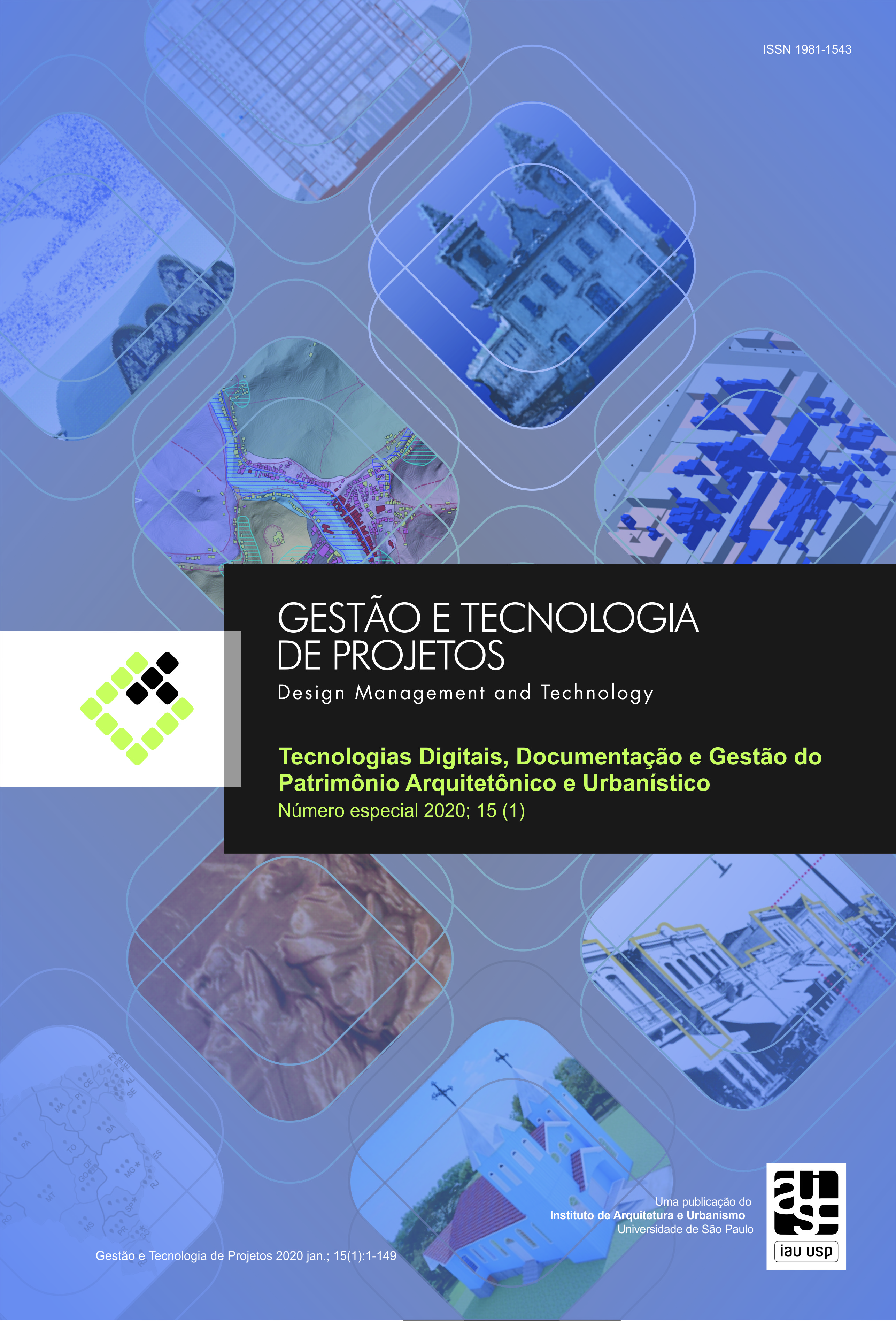iPatrimônio
Georreferenciamento do Patrimônio Cultural Brasileiro
DOI:
https://doi.org/10.11606/gtp.v15i1.152732Palavras-chave:
Patrimônio cultural, Mídia digital, Educação patrimonialResumo
De acordo com a Constituição Federal, cabe unir esforços entre Poder Público e comunidade para a promoção e a proteção do patrimônio cultural nacional. Para tanto, é necessário que existam canais de informação e comunicação entre os agentes mencionados. O presente artigo busca mostrar a importância da centralização da informação sobre os bens tombados e registrados pelos vários órgãos de preservação e o papel do georreferenciamento nesse contexto. Por meio de ampla coleta de listas e informações em websites oficiais, foi organizada uma plataforma online chamada iPatrimônio para auxiliar na divulgação do patrimônio cultural brasileiro. Durante a coleta de informações, constatou-se que, quando se trata da divulgação de informação pelos diversos órgãos de preservação: 1. vários órgãos não possuem sites próprios; 2. órgãos que possuem sites próprios nem sempre disponibilizam a lista de bens tombados ou informação sobre eles; e 3. os canais de comunicação com os órgãos não funcionam. Além disso, a plataforma iPatrimônio será analisada em comparação com o INDE e o SICG.
Downloads
Referências
ALESSANDRA, Karla. Falta de investimento põe em risco existência do IPHAN, alerta presidente do instituto. Brasília: Câmara dos Deputados, 2017. Disponível em: <http://www2.camara.leg.br/camaranoticias/radio/materias/RADIOAGENCIA/548007-FALTA-DE-INVESTIMENTO-POE-EM-RISCO-EXISTENCIA-DO-IPHAN,-ALERTA-PRESIDENTE-DO-INSTITUTO.html>. Acesso em: 09 Dez. 2018.
BARATTO, Romullo. Iphan lança plataforma de conhecimento e gestão do patrimônio construído. Archdaily, 10 Nov. 2017 [online]. Disponível em: <https://www.archdaily.com.br/br/883302/iphan-lanca-plataforma-de-conhecimento-e-gestao-do-patrimonio-construido>. Acesso em: 09 Dez. 2018.
BRASIL. Constituição Federal (1988). Constituição da República Federativa do Brasil. Brasília, DF: Senado Federal: Centro Gráfico, 1988.
BRASIL. LAI: A Lei de Acesso à Informação. s.d. [online] Disponível em: <http://www.acessoainformacao.gov.br/assuntos/conheca-seu-direito/a-lei-de-acesso-a-informacao>. Acesso em: 09 Dez. 2018.
BRASIL. Lei nº 12.527/2011, de 18 de novembro de 2011. Lei de Acesso à Informação. Brasília: Presidência da República, 2011. Disponível em: <http://www.planalto.gov.br/ccivil_03/_ato2011-2014/2011/lei/l12527.htm>. Acesso em: 18 Ago. 2018.
CAMARGO, Ana Paula Leite de; SANTOS, Isabel Pereira dos. Bibliotecas virtuais e multimídia. In: André Barbosa Filho, Cosette Castro, Takashi Tome (Orgs.). Mídias digitais: convergência tecnológica e inclusão social. São Paulo: Paulinas, 2005, p. 339-357.
G1. Congresso aprova a criação de 231 cargos para a intervenção federal no Rio e para o Ministério da Segurança. 15 Maio 2018. [online] Disponível em: <https://g1.globo.com/rj/rio-de-janeiro/noticia/congresso-aprova-mudar-a-lei-orcamentaria-para-criar-cargos-para-a-intervencao-federal-no-rio.ghtml?fbclid=IwAR3oNbMFzl6dDcKKslnAHxqrmIaMX-7pR8ayXyiFjFpTX4MwtvMrGqQs0gQ>. Acesso em: 09 Dez. 2018.
HUIBFY. O que você precisa saber para alcançar o topo do Google? Descubra aqui! 23 de agosto de 2018 [online] Disponível em: <https://hubify.com.br/blog/como-alcancar-o-topo-do-google/>. Acesso em: 18 Ago. 2018.
IBGE - Instituto Brasileiro de Geografia e Estatística. Pesquisa de Informações Básicas Municipais: Perfil dos municípios brasileiros. Rio de Janeiro: IBGE, 2015.
PATEL, Neil. O Que é SEO: O Guia Completo Para Você Alcançar o 1º Lugar do Google (2018) [online] Disponível em: <https://neilpatel.com/br/o-que-e-seo-o-guia-completo-da-otimizacao-dos-motores-de-busca/#comogooglefunciona>. Acesso em: 18 Ago. 2018.
PORTA, Paula. Política de preservação do patrimônio cultural no Brasil: diretrizes, linhas de ação e resultados: 2000/2010. Brasília: Iphan/Monumenta, 2012. Disponível em: <http://portal.iphan.gov.br/uploads/publicacao/PubDivCol_PoliticaPreservacaoPatrimonioCulturalBrasil_m.pdf>. Acesso em: 18 Ago. 2018.
REPEP - Rede Paulista de Educação Patrimonial. Princípios da educação patrimonial. s.d. Disponível em: <http://repep.fflch.usp.br/sites/repep.fflch.usp.br/files/u63/Principios%20da%20Repep.pdf>. Acesso em: 6 Mai. 2018.
ZAGATO, José Antonio Chinelato. Governos locais, participação social e patrimônio cultural: Análise da experiência de Iguape na preservação de seu conjunto urbano tombado. 2017. Dissertação (Mestrado em Políticas Públicas) - Universidade Federal do ABC, São Bernardo do Campo, 2017.
Downloads
Publicado
Edição
Seção
Licença
Copyright (c) 2020 Sandra Schmitt Soster, Anja Pratschke

Este trabalho está licenciado sob uma licença Creative Commons Attribution-NonCommercial-NoDerivatives 4.0 International License.
Autores que publicam nesta revista concordam com os seguintes termos:
- Autores mantém os direitos autorais e concedem à revista o direito de primeira publicação, com o trabalho simultaneamente licenciado sob a Licença Creative Commons Attribution-NonCommercial-NoDerivatives 4.0 que permite o compartilhamento do trabalho com reconhecimento da autoria e publicação inicial nesta revista.
- Autores têm autorização para assumir contratos adicionais separadamente, para distribuição não-exclusiva da versão do trabalho publicada nesta revista (ex.: publicar em repositório institucional ou como capítulo de livro), com reconhecimento de autoria e publicação inicial nesta revista.
- Autores têm permissão e são estimulados a publicar e distribuir seu trabalho online (ex.: em repositórios institucionais ou na sua página pessoal) a qualquer ponto antes ou durante o processo editorial, já que isso pode gerar alterações produtivas, bem como aumentar o impacto e a citação do trabalho publicado (Veja O Efeito do Acesso Livre).








